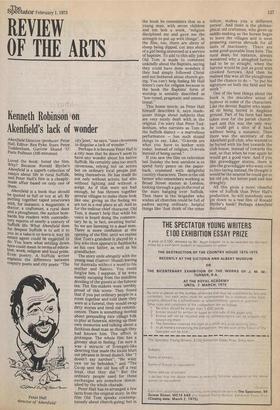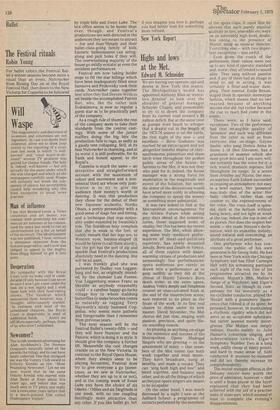Kenneth Robinson on Akenfield's lack of wonder
Akenfield Director/producer: Peter Hall. Editor: Rex Pyke. Stars: Peter Tuddenham, Garrow Shand 'LP Paris Pullman (105 minutes).
Loved the book; hated the film. Why? Because Ronald Blythe's Akenfield is a superb collection of essays about life in rural Suffolk, and Peter Hall's film is a cheaplymade affair based on only one of them.
Akenfield is a book that should be quoted in full or not at all. By Putting together taped interviews With, for instance, a magistrate, a doctor, a craftsman, a rural dean and a ploughman, the author bombards his readers with contradictory reports of nearly a century of Suffolk life. What Akenfield does for deepest Suffolk is to sell it to you in a take-it-or-leave-it way no estate agent could be expected to do. You learn what settling down here could mean in terms of-education, work, religion and local pride. Even poetry. A Suffolk writer explains the difference between country poets and city poets: "The
city 'poet," he says, "uses cleverness to disguise a lack of wonder."
Perhaps it is because Peter Hall is a city man that he doesn't seem to have any wonder about his native Suffolk. He certainly uses too much cleverness, relying not on actors but on ordinary local people just being themselves. He has made do not only without actors, but also without lighting and without a script. As if that were not bad enough, he has thrown together several villages to make them look like one, giving us the feeling we are not in a real place at all. And as for the tedious chief character, Old Tom, it doesn't help that while his voice is heard doing the commentary he is, in fact, awaiting burial. So we are listening to a dead man. There is more confusion at the opening of the film, until we realise that Tom's grandson is played by a boy who then appears in flashbacks as his own father, as well as his grandfather.
The story ends abruptly with the young man (Garrow Shand) leaving for Australia without a word to his mother and fiancee. You could forgive him, I suppose, if he were merely escaping from the mindless drooling of the guests at the funeral tea. The fim-makers were terribly proud of this scene. They found that if you put ordinary people in a room together and told them they were at a funeral, they would swap dirty stories and tired old reminiscences. There is something morbid about persuading nice village folk to play at funerals, stirring up their own memories and talking about a fictitious dead man as though they had known him. The effect is grotesque. The whole film has a gloomy shut-in feeling. I'm sure it was a miracle of Svengali-like directing that made the locals blurt out phrases in broad dialect, like "I doesn't say narthen"; "He want yew ter be beholden," and "The Co-op sent the old boa off a real treat, that they did." But the ordinary people used for these exchanges are somehow diminished by the whole charade. Peter Hall has re-arranged a few facts from the original story. In the film Old Tom speaks contemptuously about church-going; but in the book he remembers that as a young man, with seven children and ten bob a week, "religion disciplined me and gave me the strength to put up with things". In the film, too, there are shots of sheep being dipped, cut into shots of a girl being immersed at a service of baptism. To add to this silly joke Old Tom is made to comment unkindly about the Baptists, saying they could have done wonders if they had simply followed Christ and not bothered about church-going. You can't help feeling Mr Hall doesn't care for religion because in the book the Baptists' form of worship is amiably described as "low-toned, pragmatic and unemotional."
This home movie, as Peter Hall himself describes it, says inadequate things about subjects that are very nicely dealt with, in the original. I'm sorry that Peter Tuddenham, who narrates as Tom in the Suffolk dialect — a marvellous performance — has such stupid things to say. Like, "0-levels are what you have to bother with today, instead of religion; 0-levels instead of being saved."
If you saw the film on television last Sunday the best antidote is to spend forty pence on the paperback, crammed with delightful country characters. There is the old farmer who remembers working at Broad Street station in London, looking through a gap in the roof at the stars hanging over Suffolk. Then there is the brigadier who wishes all churches could be full of padres saying ordinary, helpful things like 'Just think of the other fellow; makes you a different person'. And there is the philosophical old craftsman, who gives up saddle-making as the horses begin to leave the villages and is soon preparing canvas shrouds for all sizes of machinery. There are some good quotable lines here. The rural dean, for instance, always wondered why a ploughed furrow had to be so straight, when the harvest would be just as good with crooked furrows. And then he realised this was all the ploughman had the chance to do — "to put his signature on both the field and his work."
One of the best things about the book is the macabre sense of humour in some of the characters. Like the devout Baptist who insisted on being buried in Anglican ground. Part of his farm had been taken over for the parish churchyard and this was the only way he could get a slice of it back without being a nuisance. Then there was the secretary of the Akenfield golf-club, who wanted to be buried with his feet towards the club-house, instead of towards the east, so that when he rose again he would get a good view. And if you like gravedigger stories, there is also the gravedigger who went over to lino-laying instead. He thought it would be the nearest he could get to his old job, but better paid and less draughty.
All this gives a more cheerful view of Suffolk than Peter Hall's production. So will somebody now get down to a real film of Ronald Blythe's book? Perhaps Akenfield Revisited.
by triple bills and Swan Lake. The box office seems to be busier than ever, though, and Festival's productions are well-directed at the audiences they are meant to attract — Joe and Joan ESimple and their ballet-class-going family of kids. Esoteric balletomanes can stringalong and pick holes if they will. The overwhelming majority of the house go mildly ecstatic at even the untidiest performances.
Festival are now taking bolder steps to fill the star billings which have been inadequately filled since Samsova and Prokovsky took their cards. Nutcracker came together best when they had Doreen Wells to set beside the accomplished Patrice Bart, who, like the rather lank Evdokimova, is now so regular a guest star as to be practically part of the company.
As a rough rule of thumb the rest of the company seem to take their standards from the central castings. With some of the junior staffers doing the big bits the production falls to rags, as sadly as a gaudy tent collapsing. Still, at its best Nutcracker is charming, and at its worst it is still preferable, for its frank and honest appeal, to the Royal's.
Coppelia is much the same — an attractive and straightforward account with the maximum of colour and movement and a nonsensical third act whose only justification is totry to give the audience their money's worth in dancing. It was this production they chose for the debut of their new Japanese soubrette, Noriko Ohara, a pretty personality with a good sense of stage fun and timing, and a technique that was noticeably under-extended by Swanilda's role. The fastidious may complain that she is weak in the feet, or rudely remark that her legs are, to Western eyes, banana-shaped (it would be fairer to call them sturdy), but the girl has the sort of zip and sparkle that Festival's productions absolutely need in the dancing. She will be an asset.
I was frankly glad she was partnered by Dudley von Loggenburg and not, as originally intended, by the clumsier Luis Fuente. Von Loggenburg makes Franz as likeable as anybody reasonably could — a carefree happy-go-lucky village boy to whom stabbing butterflies to make brooches comes as naturally as ragging Terry Hayworth's nicely hammed Coppelius, who seems more pathetic and foregiveable than I remember from previous years.
, The next season will be the Festival Ballet's twenty-fifth — and they will have Nureyev and the Panovs; which is doing it in style. It should give the company a further lift. Meanwhile tha cast changes crackle on at the New Victoria: In contrast to the Royal Opera House, where they always seem to be playing favourites, Festival does try to give everyone a go (sometimes, as we saw in Nutcracker, whether they are up to it or not), and in the coming week of Swan Lake you have the choice of six Odette / Odiles and six Siegfrieds in one week, with no one coupling dazzlingly more attractive than any other. If you like ballet go, but
' if you imagine you love it, perhaps you had better wait for something more refined.



































 Previous page
Previous page